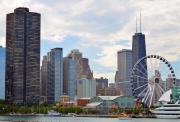Water Efficiency Watch - September 2019
In this issue of Water Efficiency Watch...
- AWE Launches New and Improved Website
- WaterSmart Innovations 2019 Preview and AWE Annual Member Meetings
- AWE Survey on Research Priorities
- AWE’s Advocacy Efforts on WaterSense Program and Tax-Exempt Rebates for Water Efficiency and Conservation
- Energy and Water Research Integration Act of 2019 Passed in House and Referred to Senate Committee on Energy and Natural Resources
- National Academies of Sciences, Engineering, and Medicine release Management of Legionella in Water Systems
- AWE Member News
- News Briefs and Web Links
- How to Submit Content for Water Efficiency Watch
AWE Launches New and Improved Website
The Alliance for Water Efficiency is excited to announce the launch of our new website! www.AllianceForWaterEfficiency.org has gotten a makeover, and the upgraded interface offers members streamlined access to resources and member-only content, and access to exclusive content in the resource library. If you are not logged into the website you may not be able to see all information and resources.
The new website offers:
- A growing resource library with expanded content only available to members.
- A webinar archive with streamlined access to members who are logged into the website.
- A membership directory with details on each member including featured news, and partnership information. See an example here.
- And more! Explore the website for yourself.
The person designated as a primary contact from each member organization has been emailed a username and password to login to the member-only section of the website. Here are a few helpful links:
- Member sign-in page
- Member account request page – please point your colleagues to this page so they can also gain access
- Password reset page
We encourage you to explore the new website, and please contact us with any questions or comments.
WaterSmart Innovations 2019 Preview and Annual AWE Member Meetings
The 12th Annual WaterSmart Innovations Conference is rapidly approaching! Join AWE and water conservation leaders from around the world in Las Vegas, October 2-3, and come a day early to participate in AWE’s only in-person advisory committee meetings and Annual Member Meeting.
Locations and times for AWE meetings are as follows:
- WaterSense & Water-Efficient Products Committee, 8:30 - 10:00 a.m., Napa A Room
- Education & Outreach Committee, 10:30 a.m. - 12:00 p.m., Napa A Room
- Water Efficiency Research Committee, 1:30 - 3:00 p.m., Napa A Room
- Annual Member Meeting & Reception, 5:00 - 7:30 p.m., Sonoma C Room
The featured speaker at AWE's Annual Member Meeting will be Nevada Assemblyman Howard Watts, who will discuss how the Nevada Legislature passed AB 163—which improves water efficiency and conservation plans in Nevada—and how AWE's State Scorecard helped him make the case for the bill. The meeting will be followed by our usual food and drink and the water conservation music night!
WaterSmart Innovations
The 2019 WaterSmart Innovations Conference will begin with a keynote address by George Hawkins on Wednesday, October 2. Hawkins recently launched a consulting business, Moonshot LLC and nonprofit organization, Moonshot Missions. He is the former CEO and general manager of DC Water.
Be sure to look out for the Alliance for Water Efficiency and California Water Efficiency Partnership at the following sessions:
Wednesday, October 2
- 1:30 pm “AWE Landscape Transformation Research Project: Assessment of Utility Programs and Market Readiness Evaluation” – Maureen Erbeznik
- 1:30 pm “So Many Water Efficiency Codes and Standards and Programs: How to Choose” – Thomas Pape
Thursday, October 3
- 9:00 am “Scorecards Galore: State Policy Resources to Track and Initiate Progress” – Bill Christiansen and Lacey Smith
- 11:00 am “Developing Sustainable Urban Landscapes: AWE’s Research and Programs” – Mary Ann Dickinson
- 3:30 pm “Progress Toward a Multi-Benefit Framework for Water Management: Sustainable Landscapes Test Case – Lisa Cuellar and Sarah Diringer
Register for the WSI 2019 conference and get more info here. ![]()
AWE Survey on Member Research Priorities
The Alliance for Water Efficiency is surveying its membership to identify and prioritize research interests and needs. The results of this survey will be utilized by AWE’s Water Efficiency Research Committee to direct its efforts. Please participate and help AWE better serve its members. We estimate it will take less than 5 minutes to complete. The survey will be live through Friday, September 20. Take the survey here. ![]()
AWE Advocacy Efforts
AWE continues to work on federal issues related to funding the WaterSense program and getting water efficiency and green infrastructure rebates to be tax exempt.
WaterSense: Congress is back in session and working on appropriations. It now appears quite likely, if not certain, that they will not complete action on all 12 appropriations bills by the upcoming Sept. 30 deadline (the end of the federal fiscal year). While the House has passed all 12 bills, including the spending bill for Interior/EPA containing instructions to continue WaterSense, the Senate has passed no spending bills. In fact, the Senate Appropriations Committee will this week mark up the first four appropriations bills (the FY 2020 spending bills for the Department of Defense; Energy and Water Development; State and Foreign Operations; and Labor, Health and Human Services and Education). No word yet on when they will get to Interior/EPA.
Even if the Senate moves promptly on a bunch of appropriations bills, their versions will be significantly different from the House bills. So there will likely be extensive conference committee deliberations to get things in line. It seems now likely that bipartisan leadership will agree on a continuing resolution that extends the deadline for new spending measures until Thanksgiving. We will continue to monitor any committee reports to ensure that instructions regarding WaterSense remain intact. Even though we were successful in getting WaterSense authorized, getting actual money into that line item has proved to be more difficult than we expected.
Tax-exemption for rebates: AWE sent a support letter signed by 75 organizations to support HR 2321, a bill to make water efficiency and green infrastructure rebates tax exempt. Unfortunately, there does not appear to be any movement in the House on a “green” tax bill that might include the provisions of HR 2321. The only environment-related tax bill given any chance this year is a proposal to expand the tax credits for electric vehicles. House leaders will likely try to include a tax-extenders bill as part of year-end spending bills, but that would not at this time include any tax-law changes—just renewal of several provisions that have expired or are about to expire.
AWE will continue to push this issue and we will keep you all informed.
National Academies of Sciences, Engineering, and Medicine release Management of Legionella in Water Systems
New reports of Legionella seem to pop up nearly every day. Indeed, research shows that instances of Legionella increased more than five-fold from 2000 to 2017. As Legionella is waterborne, water industry professionals have an indispensable role to play in the safe management of water systems and must stay apprised of developments regarding Legionella. To this end, the National Academies of Sciences, Engineering, and Medicine recently released a comprehensive report ![]() which surveys the “state of the science” on the biology of Legionella, the role of water systems in its transmission, quantifying illness cases, strategies for preventing and controlling the spread of Legionella, and policy issues relating to the management of this multidimensional issue. A webinar launching the report can be found here.
which surveys the “state of the science” on the biology of Legionella, the role of water systems in its transmission, quantifying illness cases, strategies for preventing and controlling the spread of Legionella, and policy issues relating to the management of this multidimensional issue. A webinar launching the report can be found here. ![]() This report has crucial takeaways for the water industry.
This report has crucial takeaways for the water industry.
Threshold of Legionella concentration: The report authors recommend establishing an “action level,” or a threshold of Legionella concentration that triggers action to remediate the system, of 5 x 10^4 Colony Forming Units (CFU)/Liter. At this level of concentration, “serious concern” is warranted. For facilities such as hospitals and skilled nursing facilities where users may be more susceptible to Legionella, the action level may be reduced.
Water temperature: Legionella grows optimally at water temperatures between 25° and 43°C. The report authors recommend that buildings maintain hot water heater temperatures above 60°C, with water temperature to distal points above 55°C.
Unintended consequences of water and energy conservation measures: The report authors identify the fact that water and energy conservation measures may have unintended consequences that may contribute to Legionella growth. These unintended consequences may include increased water age, less effective scouring of pipes, and water temperatures too low to effectively combat Legionella growth. In addition to recommendations on water temperature, the report authors recommend disallowing low-flow water fixtures in facilities where users may be vulnerable to Legionella, including hospitals and skilled nursing facilities. They also recommend amending green codes and green certification criteria for buildings to account for the risk factors of Legionella outlined in the report. Further research is required, but the authors suggest that water and energy conservation are still possible as long as unintended consequences are addressed.
Cooling towers: The report authors recommend that facility managers ensure their existing cooling towers operate safely, with appropriate temperatures and disinfectants. Also recommended is further research into new cooling tower systems that operate at temperatures high enough to prevent growth of Legionella.
Policy recommendations: The report authors offer policy recommendations to help manage Legionella, including implementing required Legionella monitoring in facilities receiving funding from the Centers for Medicare & Medicaid Services, required registration of cooling towers, and required water management plans in public facilities.
The goals of safe management of Legionella and conservation are not mutually exclusive but, as this public health issue continues to develop, water industry professionals must remain abreast of the science and prepare to account for Legionella in their systems. AWE President and CEO Mary Ann Dickinson will be speaking at the 2019 Legionella Conference on Thursday, September 12th about AWE’s ongoing research into cooling technologies. For more information, visit the conference website. ![]()
Energy and Water Research Integration Act of 2019 Passed in House and Referred to Senate Committee on Energy and Natural Resources
Research from the “DOE has found that 196 billion gallons of water per day are withdrawn for thermo-electric cooling to support power generation, in comparison to 44 billion gallons of water per day that are withdrawn for public supply.” In addition, River Network estimates in The Carbon Footprint of Water ![]() that an equivalent to 13 percent of the U.S. electricity consumption is water-related.
that an equivalent to 13 percent of the U.S. electricity consumption is water-related.
Despite these known and accepted connections between water and energy, work remains to be done to reduce the consumption of energy and water together. Occasional projects at the utility level have shown what can be done when these resources are considered together. AWE and the American Council for an Energy-Efficient Economy (ACEEE) awarded selected programs ![]() for exceptional efficiency programs that save both water and energy.
for exceptional efficiency programs that save both water and energy.
If passed, the Energy Water Integration Act of 2019 has the potential to advance water and energy efficiency through a joined approach to accelerate the rate at which we integrate the two efficiency fields. The bill calls for the Department of Energy to consider water in energy research, development, and demonstration programs by advancing energy and energy efficiency technologies with water conservation and efficiency in mind, considering the impact of climate change on water supplies and quality, and improving the understanding of the water-energy nexus. Read the bill language here. ![]()
While there are plenty of viable research options, AWE and ACEEE developed a white paper detailing recommendations for future research opportunities after analyzing what research already exists. For more information on this topic, check out these resources.
AWE Member News
- Ecosystems completes 16-month retrofit program using Freddie Mac’s Green Advantage Program. Learn more here.

- UK based, Rezatec publishes blog post about the impact of recent dam and reservoir failures. Learn more here.

- City of Longmont, CO offers irrigation consultation through Resource Central’s Slow the Flow program. Learn more here.

- City of Bozeman, MT partners with Dropcountr to launch water use app. Learn more here.

- City of Hays, KS recognizes a residential and commercial property with a Water$mart Landscape Award. Learn more here.

News Briefs and Web Links
Stanford researchers evaluate the impact of smart faucets on water conservation - To determine whether a sink that adapts to personal washing preferences can reduce water use, a researcher controlled a sink that participants believed to be an autonomous sink. The study finds that the sink reduces water use, and impacts the water use behaviors of the participants in future washing without the autonomous sink. Learn more here. ![]()
DOE publishes a Notice of Proposed Rulemaking to consider creating a new class for residential dishwashers - The current two product classes are standard dishwashers and compact dishwashers. DOE is proposing the addition of a third product class for standard dishwashers with a cycle time of 60 minutes or less. See here ![]() for the proposed rule, and click here
for the proposed rule, and click here ![]() for frequently asked questions and how to submit comments.
for frequently asked questions and how to submit comments.
Drought-tolerant barley could help 'future-proof' whisky industry - Barley is the fundamental raw material for both whisky and beer production, but extreme heat is having a catastrophic effect on crop yields across Europe. Thankfully, scientists are developing a barley plant that has the ability to retain more water. Learn more here. ![]()
Phoenix Sky Harbor switches to desert landscape to save water, money - Phoenix Sky Harbor International Airport replaced 11 acres of turf with native flora as part of a water conservation project. This upgrade to sustainable landscaping is expected to save nearly half a million dollars and five million gallons of water annually. Learn more here. ![]()
Emerging Water Technology Symposium - The 7th Biennial Emerging Water Technology Symposium (EWTS) will be held May 12-13, 2020 in San Antonio, TX. The conference is seeking abstracts on water-energy nexus, educational and behavioral issues, water efficiency in buildings, water quality issues, alternate water sources, 3-D modeling for plumbing and mechanical applications, and more. Abstracts are due by October 1, 2019. Learn more here. ![]()
World Water-Tech North America - AWE's Mary Ann Dickinson will be a speaker at this gathering of North American and global water leaders, utilities, municipalities, local government, technology giants, engineering companies, investors and entrepreneurs, to be held October 29-30 in Los Angeles. Learn more here. ![]()
How to Submit Content for Water Efficiency Watch
Water Efficiency Watch welcomes submission of articles, photos, stories, commentary, new technologies, web links, etc. Please email your submission to Liam McCarthy. ![]()
DISCLAIMER: The Alliance for Water Efficiency reports on research and information as a service. This should not be considered an explicit or implicit endorsement of any product, service, research effort, analysis, etc. unless specifically so indicated.





